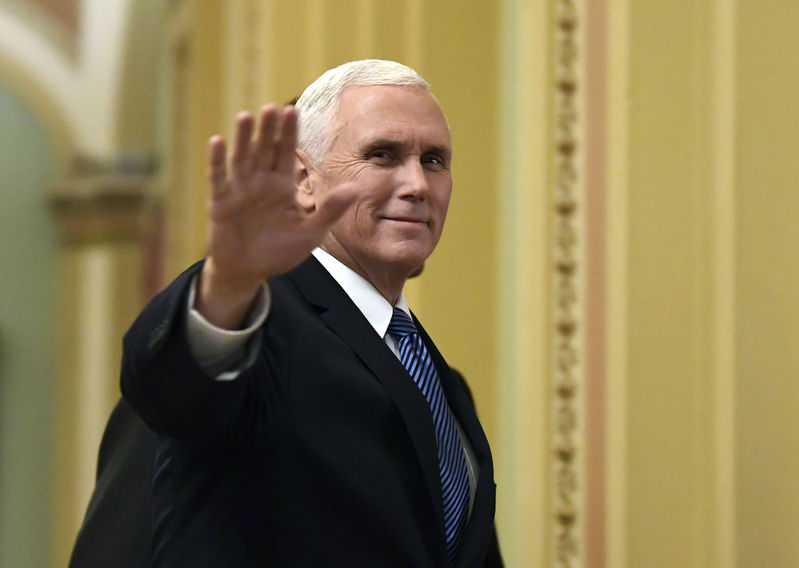Aid cuts, Israel capital top Pence trip agenda
21 January, 2018

U.S. Vice President Mike Pence is making his fourth visit to Israel, returning to a region he’s visited “a million times” in his heart.
An evangelical Christian with strong ties to the Holy Land, Pence this time comes packing two key policy decisions in his bags that have long been top priorities for him: designating Jerusalem as Israel’s capital and curtailing aid for Palestinians.
Pence departed as scheduled Friday evening. Alyssa Farah, a Pence spokeswoman, said the trip was “integral to America’s national security and diplomatic objectives” and would go on as scheduled.
Since his days in Congress a decade ago, Pence has played a role in pushing both for the shift in U.S. policy related to the capital and for placing limits on funding for Palestinian causes long criticized by Israel.
Traveling to Israel just as Palestinians have condemned recent decisions by U.S. President Donald Trump’s administration, Pence will arrive in the region as a longtime stalwart supporter of Israel who has questioned the notion of the United States serving as an “honest broker” in the stalled peace process.
The vice president will hold four days of meetings in Egypt, Jordan and Israel during his visit, the first to the region by a senior administration official since Trump announced plans in December to designate Jerusalem as Israel’s capital and begin the process of moving the U.S. Embassy from Tel Aviv, angering Palestinian leaders.
His trip will also follow Tuesday’s announcement that the U.S. is withholding $65 million of a planned $125 million funding installment to the U.N. Relief and Works Agency, which provides health care, education and social services to Palestinians in the West Bank, Gaza Strip, Jordan, Syria and Lebanon.
Both decisions have come as Trump has expressed frustration over a lack of progress in restarting peace negotiations between Israel and the Palestinians, who withdrew plans to meet with Pence during his visit to the Middle East.
Senior White House officials said security issues, countering terrorism and efforts to push back against Iran would figure prominently during Pence’s trip, which concludes on Tuesday. But the vice president also is expected to face questions about Israel’s future.
On the embassy, Pence played a steady role in pushing for the shift in U.S. policy. The decision upended past U.S. views that Jerusalem’s status should be decided in negotiations between Israel and the Palestinians, who claim east Jerusalem as the capital of their future state.
Pence had wanted the Trump administration to convey “a clear-cut policy” on Jerusalem after the president asked him last summer to visit the Middle East, White House officials have said.
Pence discussed the issue with Jewish and evangelical leaders in the months leading up to the decision and advocated for the plan within the administration. But he noted to religious leaders late last year that the decision was the president’s alone and would fulfill a commitment from the 2016 campaign.
Pence has long aligned himself with Israel.
In Congress, he pushed for limiting U.S. aid to the Palestinian Authority during the presidency of George W. Bush, warning the funding could be redirected to groups like the militant Hamas movement, which controls Gaza.
He was a vocal advocate for Israel’s security fence and cosponsored the Jerusalem Embassy and Recognition Act in 2011 to recognize Jerusalem as Israel’s undivided capital. Veteran House members recall Pence’s role as a staunch ally of Israeli causes and his steadfast support for moving the embassy to Jerusalem at times when few were talking about the issue.
Trump’s decision on Jerusalem has drawn protests from Middle Eastern leaders and prompted Palestinian President Mahmoud Abbas to pull out of a planned meeting with Pence in the biblical West Bank town of Bethlehem. Administration officials said Pence is not expected to meet with Palestinian leaders during the trip.
Pence remains popular with evangelical voters in the U.S., a large and influential constituency that helped propel Trump to victory in last year’s election. American evangelicals, especially the older generation, have a strong affinity for Israel, drawn both on spiritual grounds and a genuine love for the modern-day country and the Jewish people.
Source:
TAG(s):
